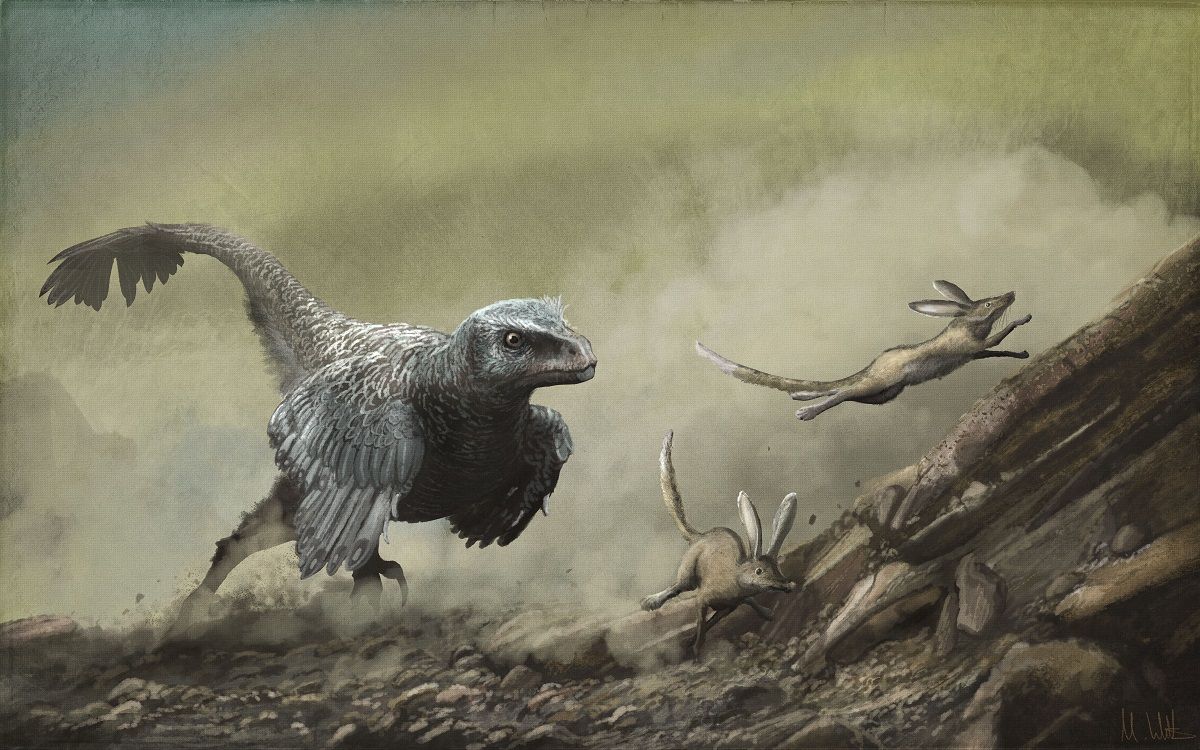Dilophosaurus, time-traveling cows, and the pursuit of truth
I recently took my son to a dinosaur exhibition. He was excited, pointing out all the different dinosaurs. Our friends were particularly impressed when he named an ankylosaurus without prompting—proud dad moment. However, the next dinosaur he found was harder to guess.
It stood on two legs, had a crest on its head and a giant frill—it was a Dilophosaurus. Well, it was meant to be. But there’s no evidence that the Dilophosaurus had a frill. This Dilophosaurus had originated in the 1993 movie Jurassic Park.
In Jurassic Park, producers wanted a dinosaur that seemed harmless at first but quickly turned scary. In the book, the same scene involved an accurate Dilophosaurus, but that wouldn’t fit the movie’s goals. So they shrunk Dilophosaurus, made it spit venom and gave it the infamous frill—and it stuck.

32 years later, we’re still seeing frilled Dilophosaurus. This is not a true representation, but society has accepted and come to expect it. This got me thinking about truth, untruth and lies.
What even is truth?
What is the truth? As I’ve come to appreciate, is not a straightforward question, which is frustrating since we’re talking about... truth.
After long conversations with ChatGPT and DeepSeek—I’m sharing my data between superpowers—I’ve come to a pragmatic framework, appreciating the field of philosophy.
Broadly, there are four types of truth—objective, subjective or personal, provisional, and societal (this one is odd).
Objective truth—the cold hard facts
Objective truth is independent of perception and is true regardless of opinion, perspective, or belief. It is testable, measurable, and verifiable. I.e., water boils at 100°C.
The more I’ve tried to think of examples of objective truth, the more I appreciate how hard it is to define truth without perception. For instance, the sun is hot—objective truth? It measures a billion degrees on its surface. However, what is hot? Would something be hot without something else to perceive it as hot?
As hot is a perception, does that make it a subjective truth—could something exist that perceives the sun as not hot? Is a better objective truth that it has a surface temperature higher than 5,000°C?
Subjective or personal truth
Subjective truth is true for you but not others. It’s based on beliefs, experience, and emotions. I.e. I think hot sauce is delicious, my son does not.
We’re in a cultural moment where people’s personal truth (or perceived truth) is amplified through social media and has a larger emphasis than other types of truth. This has started to clash and undermine the next type of truth (and objective to a lesser extent).
Provisional truth—truth that can change
Provisional truth is something we accept as true now but is open to revision with new evidence. Pluto was considered a planet; however, as scientific consensus changed, Pluto lost its planet-ness—it was true that Pluto was a planet, but now it is not.
A practical example is eggs in our diet. For years, people deemed eggs unhealthy due to high cholesterol levels contributing to heart disease. However, our understanding of dietary and blood cholesterol dynamics has evolved, and the effect is smaller. Truth has shifted—eggs are now considered part of a healthy diet.
Provisional truth is truth as a moving target. As the target moves and new information emerges, we must change our idea of this truth.
This is my favourite truth as it keeps you grounded but open to new evidence. I think of provisional truth as truth we hold lightly. It’s not just for scientific use. We’ve enough evidence to decide something is true until proven otherwise.
Provisional truth is not objective as it can change, but it is not subjective as it is based on more than personal, anecdotal evidence.
Back to dinosaurs. When Jurassic Park first released, it was celebrated for its scientific accuracy (despite Dilophosaurus)—the dinosaurs were relatively true representations. However, more evidence has emerged, the largest being that Velociraptor was covered in feathers. The scaly lizard raptor was no longer accurate, there was a new updated truth.
Society has blurred the distinction between provisional truth and subjective truth. As provisional truth can change, an individual can decide it is not true for them as their experienced subjective truth is true.
Societal truth—the truth that exists because we all agree on it
Societal truth is weird. It’s only true because society agrees on it. It’s shaped by culture, language and norms. It’s entirely subjective but held by society. You feel societal truths, yet if society changed its mind, it wouldn’t be true.
Money’s value is a societal truth, as is the concept that diamonds and rubies are precious—they’re really just fancy rocks we covet.
Societal truths are not subjective. Your disbelief doesn’t make a societal truth untrue—money’s worth remains because society hasn’t renounced it.
Societal truth is independent of the individual and held collectively, often institutionalised.
Our current political leaders are a heavily institutionalised societal truth. Without consensus from society and the supporting institutions, what are they?
This can be confused with objective truth—the name of a prime minister/president is a fact. However, I’d argue current leaders are a societal truth, whereas past leaders’ is objective. Society changing its belief now, doesn’t change past beliefs.
Societal truth creates an interesting dynamic. Is something true because it is objectively or provisionally true? Or is it just because we value as a society?
What happens when truth shifts or changes?
When I think about it Pluto’s planet status brings me a sense of nostalgia. Conversely I was horrified as a teenager to learn that dinosaurs were likely feathery rather than scaly. Both were once true but changed with new evidence.
Not all untruths are born from scientific discovery or misunderstandings. Some are accidental interpretations, lingering myths, or intentional. There’s a distinction between untruth and a lie.
What is untruth, what is a lie?
Truth is complicated and contextual. What is true is generally true for all, apart from some societal and personal/subjective truths.
However, it wasn’t the truth of Dilophosaurus’ frill-less neck that annoyed me—it was how the frill lie was perpetuated. Dilophosaurus’ frill has almost become a societal truth!
However, the frill doesn’t feel like a lie. Lies are intentional efforts to deceive someone and are malicious. Lies come with the intent to deceive. There’s nothing malicious about the frill, nothing to be gained by perpetuating it. It’s an urban myth. It’s not a lie, it’s simply untrue.
Untruth is what I’ve been mulling over. Two types in particular: things that are accepted but never true and the shadow side of provisional truths (once true but no longer).
Acceptance of untruth
Dilophosaurus’ frill is a prime example of an accepted untruth. Why are we ok with the propagation of misinformation?
From my reading, there seem to be four primary reasons for accepting untruth:
- Cognitive bias—we believe things that support our existing worldview,
- Authority bias—we believe things told by perceived experts.
- Social bias—we believe it because others do.
- Apathy—The truth doesn’t matter/change anything
Cognitive bias deserves its own article. We seek things that support our worldview. Pair this with social bias and without regulation, what is true for one tribe is untruth for another—this is how echo chambers and polarised media have become a problem.
Authority bias is more innocent but just as devastating.
Authorities sometimes rely on truths that have become untraceable. It's too hard to verify the truth so we accept it and move on.
Did you know your blood vessels can wrap around the planet twice? It's a commonly held as fact but it's not true—the original source was lost. Kurzgesagt has a great video on how they found the original source and determined the real truth.
One of the most notorious accepted lie (it’s not untruth, this information was spread maliciously) is the link between vaccines and autism, from a 1998 The Lancet paper by Andrew Wakefield. He falsely claimed the MMR vaccine caused autism.
The study faced immediate criticism (made bold claims from a sample size of 12 children and questionable methodology) and Wakefield had known conflicts of interest in a competing vaccine.
The problem with Wakefield’s paper is the information came from a trusted source—an authority. Before publishing his paper, Wakefield was a respected authority in his field. It’s unreasonable to expect the average person to interrogate a scientific paper’s methodology—you trust the expert. This abuse of power demonstrated authority bias in action.
It took 12 years for the Lancet to fully retract the paper, and Wakefield lost his medical license due to his unethical behaviour. But the damage was done, and the anti-vaccine movement took off.
Authority bias still influences the anti-vaccine movement, but the authority is not a scientific body—it’s now the self-proclaimed experts. Anti-vaccine has become more of a political and cultural identity, with cognitive and social biases at play than an authority one.
The shadow side of provisional truth
The moving nature of provisional truth can be hard for people to grasp, especially in scientific research, which changes based on evidence. If evidence disproves an idea, it is incorrect and a new truth is declared. Society finds this hard.
Publicly admitting something wrong isn’t seen as a virtue, but weakness and uncertainty. If you were wrong about that, why should I trust you with this?
Pluto was once accepted as a planet, but scientific consensus changed and it is now not a planet. What is the truth here? Are the scientists to still be trusted? (Of course)
Back to dinosaurs—our understanding has developed with new fossil evidence. The idea of a dinosaur as a bipedal scaled lizard is outdated—but it persists. Why?
Jurassic Park’s raptors are scary and cool. If they were fluffy and chirped like birds, the vibe would change. The Jurassic Park raptor was the first representation people encountered. The scientific understanding changed, but the movie, its many sequels and society’s expectations did not.

Many people deny the theory of evolution, but the fossil record supports it. It would be easy to disprove: a fossil cow in the Cambrian layer would mean either evolution is wrong or we have a time-traveling cow.
The issue is that time-traveling cows (metaphorically) appear and don’t change perception or people’s view of the truth. Andrew Wakefield’s fraudulent vaccine study was thoroughly debunked and disgraced—yet people still cite it.
As more evidence emerges, we change our interpretations and our idea of truth changes. Truth moves forward and people struggle to keep up. Was it ever true?
Finding the truth is harder than ever.
It’s challenging to decipher the truth in today’s information age. We’re seeing political polarisation, tribalism and movements with differing ‘truths’. Public, media, or authority figures abuse these perceptions for their own agendas.
If you were in the anti-vax movement and discovered the scientific truth, challenging the group’s truth-less beliefs would see you vehemently disagreed with. You would be counter-argued by their ‘real’ truth.
If you’ve spent a long time in a community with untruths, breaking free would be hard. It’s hard to break from societal, authority, and cognitive biases. In pursuing truth, you risk losing relationships and community.
The same goes for strong political positions. The truth doesn’t matter—feelings don’t care about facts.
So what even is true?
So what is true? We need to get better at questioning and challenging norms intelligently. How do we question norms and seek the truth without becoming conspiracy theorists? Social media is geared towards polarising or conspiracy-laden/propaganda content. How do we decipher this?
Start with something you are an expert in—your work perhaps. What’s something you’ve been told that you accepted? Determine the type of truth: subjective or provisional?
What industry best practices contradict your findings? What convenient practice do you believe?
Investigate, research, experiment—find your truth. It’s not enough to say you don’t believe it—prove it.
Admit your knowledge limits. Be okay with not being an expert. Watching a few hours of YouTube videos on why electric cars are bad doesn’t make you an expert.
Be open to evidence and seek different opinions. Read diverse political media and think for yourself to get closer to the objective truth.
Closing thoughts—what is true or untrue about you?
The nature of truth is complex and multifaceted. Navigating types of truth, overcoming biases, and deciphering what is true is hard.
It’s easy to dismiss this pursuit of truth as a purely academic or abstract thought experiment—something with little bearing on our lives. It’s comfortable in our truth bubble. However, untruths aren’t just about dinosaurs and science; they shape how we see ourselves, too.
What do you accept as true about yourself? What untruths do you believe?
I had to be able to run 10km before I could believe I wasn’t unfit. The 10km was the time-traveling cow I needed to smash an untrue perception I had of myself.
The pursuit of truth is deeply personal. It requires humility, curiosity, and a willingness to be proven wrong. If you choose to proceed, you will be better for it.
Dilophosaurus shows how sticky untruth can be.
As the philosopher Bertrand Russell said,
"The fundamental cause of trouble in the world today is that the stupid are cocksure while the intelligent are full of doubt."
This quote is in the context of the rise of Nazi fascism in 1930s Germany—yet still reads like it was written for today.
What untruth are you holding onto? Where do you need a time-traveling cow to appear? And remember, Dilophosaurus didn’t have a frill!




